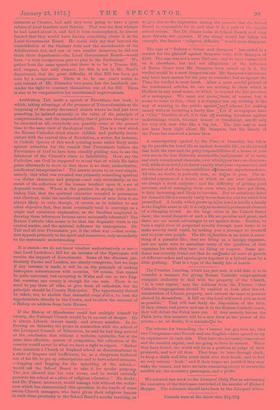Archbishop Tait made a speech at Faversham last week, in
which, taking advantage of the presence of Nonconformists at the reopening of the newly-decorated church where he had just been preaching, he insisted earnestly on the value of the principle of comprehension, and the impossibility that if private thought is to be exercised at all, everybody can possibly come at the present time to the same view of theological truth. This is a view which the Roman Catholics think almost childish and perfectly incon- sistent with the central idea of Revelation, a writer, for instance, in Catholic Opinion of this week pointing some rather lively satire against ourselves for the remark that Protestants believe the Providence of God to have been steadily guiding men to see the falsehood of the Church's claim to Infallibility. How, say the Catholics, can God be supposed to reveal that of which He takes pains afterwards to show us that there is no clear, authoritative, intellectual interpretation? The answer seems to us very simple, namely, that what was revealed was primarily something spiritual —a divine character and purpose—and only secondarily, as the result of the reflection of the human intellect upon it, a set of -dogmatic truths. Where is the paradox in saying, with Arch- bishop Tait, that the spiritual character revealed is permanent and identical, while the intellectual inferences of men from it are always likely to vary, though, of course, as in relation to any other objective fact, they must eventually tend to converge on a single and consistent explanation, as the faculties employed in drawing these inferences become more universally educated? The Roman Catholic idea seems to be that the dogmatic truth is the central matter, and the spiritual influence its consequence. Dr. Tait and all true Protestants put it the other way :—that revela- tion appeals primarily to the spirit and conscience, only secondarily to the systematic understanding.






































 Previous page
Previous page